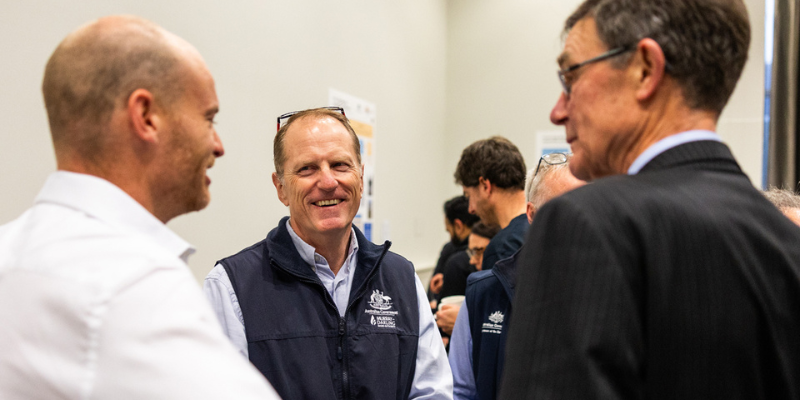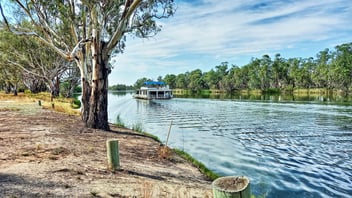VIC Source: Leading Australia’s Water Future: A Conversation with Andrew McConville on the Murray-Darling Basin

If you have ever spoken to Andrew McConville, his genuine warmth and passion for what he does shines through immediately, and it is clear to see he is in the right job, taking the helm of the Murray-Darling Basin Authority (MDBA) as Chief Executive Officer in May 2022.
Leading with both purpose and passion, McConville’s vision is clear: a sustainable, community-centred approach to managing Australia’s largest and most complex river system. Spanning over a million square kilometres across four states and one territory, the Murray-Darling Basin serves as a lifeline for millions, from diverse communities to agricultural sectors and tourism hubs. It is, as McConville put it, “a massive environmental asset, an economic engine for the nation,” and safeguarding it is crucial.
“Our job as the MDBA is to see the whole system,” McConville explains. His role is to keep a bird’s-eye view of the Basin, weighing the needs of its countless stakeholders and communities. It’s a difficult balance to strike, given the area’s environmental, economic, and social demands, yet McConville approaches the task with optimism.
“We all benefit from a healthy river system,” he says, underscoring the urgency of maintaining a sustainable future for generations.

Lessons from the International Stage
Recently, McConville attended the 10th triennial Congress of the International Network of Basin Organisations in France, a gathering where global water management leaders exchanged insights on issues like climate change, aging infrastructure, and environmental water recovery.
McConville had the opportunity to speak on the Murray-Darling Basin Plan and its role in supporting the achievement of water and environmental policy outcomes, as well as outlining how the Basin Plan and its River operations provide quantitative tools for the management of water scarcity. The experience reinforced his belief in Australia’s leadership in water policy.
“Australia has a much more developed market-based system for water management, more advanced than in most places worldwide,” McConville observed, referencing the Murray-Darling Basin Plan as a model for other countries. Despite debates within Australia, he emphasised that the whole-basin approach and the MDBA’s planning framework make Australia “the envy of most parts of the world.”
.png?width=872&height=436&name=vic-source-blog-andrew-mcconville-800x400(4).png)
Building a Culture of Purpose and Innovation
For McConville, it’s about fostering a culture within the MDBA that drives meaningful outcomes. With a focus on values— being courageous, bringing energy and being in community —the organisation aligns its work toward a shared purpose: Rivers for Generations.
“Everything we do is in pursuit of our purpose,” McConville said, underscoring how deeply the goal resonates within the MDBA. This mission-driven approach fosters unity, making MDBA employees feel like “water running across the floodplain, all flowing in the same direction.”
“It' s not just a slogan on the wall. Everything that we do, we ask is this supporting the achievement of Rivers for Generations. And if it's not, then we ask the legitimate question as to why we are doing it.”
McConville also encourages a culture of innovation and resilience. “As public service organisations, we can be scared of failure, but innovation and progress most often come out of making mistakes,” he says. His leadership promotes an environment where calculated risks and creativity are encouraged, and he believes this openness is essential for achieving breakthrough solutions.
Facing the Basin’s Challenges
McConville’s leadership coincides with pressing challenges, from climate change impacts to policy decisions on water scarcity and constraints. He’s unflinching about the obstacles ahead, noting the MDBA’s unique role in navigating these complexities and doing so with a courageous mindset.
“We don’t get a second chance at this for the Basin or for the community. We have this massive environmental asset, which is a huge economic engine for the nation. You don't get to have another crack at it.” he says.
Key among the challenges are climate resilience, managing competing demands, and building a more adaptable Basin Plan. “The original Basin Plan was created when ‘our feet were on fire,’ coming out of the millennium drought,” he explains. “Now we know more and understand more about environmental water use, and it’s time to make the plan more nuanced and adaptable.”
He highlights the issue of “constraints,” areas where physical and operational limits restrict water flow. For the MDBA, addressing constraints is essential to maximise the impact of environmental water, which McConville describes as a critical step toward environmental recovery and the Constraints Relaxation Implementation Roadmap will be key in bringing this to life.
.png?width=972&height=486&name=vic-source-blog-andrew-mcconville-800x400(5).png)
An Inclusive, Consultative Approach
For McConville, involving communities and stakeholders in decision-making is non-negotiable. Being more inclusive, more consultative, vulnerable and okay with not having all of the answers.
The MDBA’s Early Insights Paper is an example of this commitment, a preliminary document shared with the public to invite input on the Basin Plan’s most pressing areas: First Nations, climate change, Sustainable Water Limits and Regulatory design. Moving beyond a ‘just add water’ approach.
Initial community and stakeholder feedback has been overwhelmingly positive, and consultation will continue as we head toward the 2026 Basin Plan Review.
McConville believes that all the great policy successes in life have been achieved through bringing the community on the journey and having the right conversations with the right people in the room.
“You can’t bring the community on board with something as significant as the Basin Plan if you’re not going to do it with them,” McConville says. Building trust is fundamental to this approach. “We need that input; we need that consultation. The power of the collective is enormous,” he says.
By creating what he calls a “container for holding tension,” McConville believes that holding tension can yield powerful breakthroughs. “The longer you hold tension, the greater the breakthrough you're going to get,” he says.
.png?width=858&height=429&name=vic-source-blog-andrew-mcconville-800x400(2).png)
How AWA Victorian Members can support the MDBA in these vital goals
McConville reinforces how the most important thing we can do as a community and water sector, is to work together, “Let's find a way through this together. Because water is a wicked problem. And, you know, no matter what we do, there's always going to be challenges. So being prepared to come to the table, sit down and have sensible conversations focused on solutions, not on just problems is really important,” he urges.
Working across communities and in close collaboration when it comes to something like Constraints is another key point McConville raises, “As the states work together to develop the roadmap for constraints, whilst making sure that we can be practical and develop some really important steps as we go forward.”
Finally, and unsurprisingly given how much emphasis the MDBA puts behind this, embracing the process of consultation and bringing forward new ideas, “It is important to remember that there's no such thing as a bad idea. And equally recognise that not every idea is a great idea either,”
“It is our job as the MDBA to take and synthesise a huge amount of information and find a pathway forward. Our commitment is that we will share with people the decisions we've made and why we've made them. But we need that input and that is extremely important.”
.png?width=858&height=429&name=vic-source-blog-andrew-mcconville-800x400(3).png)
A Vision for the Future
As he continues to lead the MDBA into the future, McConville is not shy about the scope of his ambitions. His vision for the Murray-Darling Basin is not simply one of crisis management but one of genuine innovation and resilience. The aim is a Basin Plan adaptable to the realities of climate change, responsive to community needs, and grounded in sustainable practices.
“It’s about taking an integrated approach to land and water management,”
McConville remains hopeful that together we can find a collective path forward, despite the challenges. “We’ve got to find ways to work together across communities, tackling this challenge head-on, with transparency, courage, and a commitment to future generations,” he says, emphasising that the MDBA’s decisions will shape the future of Australia’s most critical water system.
“The future of our rivers is in our hands, and together, we can ensure they thrive for generations.”

